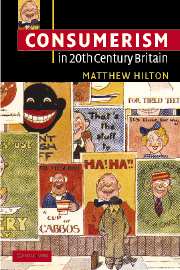Book contents
- Frontmatter
- Contents
- List of illustrations
- Acknowledgements
- List of abbreviations
- Introduction: luxury's shadow
- Part I Necessity
- Part II Affluence
- 6 The new consumer: good housewives and enlightened businessmen
- 7 The professionals: the origins of the organised consumer movement
- 8 Individualism enshrined: the state and the consumer in the 1960s
- 9 The right to shop: consumerism and the economy
- 10 The duty of citizens: consumerism and society
- 11 Affluence or effluence: globalisation and ethical consumerism
- Conclusion: the quantity or the quality of choice
- Bibliography
- Index
11 - Affluence or effluence: globalisation and ethical consumerism
Published online by Cambridge University Press: 10 December 2009
- Frontmatter
- Contents
- List of illustrations
- Acknowledgements
- List of abbreviations
- Introduction: luxury's shadow
- Part I Necessity
- Part II Affluence
- 6 The new consumer: good housewives and enlightened businessmen
- 7 The professionals: the origins of the organised consumer movement
- 8 Individualism enshrined: the state and the consumer in the 1960s
- 9 The right to shop: consumerism and the economy
- 10 The duty of citizens: consumerism and society
- 11 Affluence or effluence: globalisation and ethical consumerism
- Conclusion: the quantity or the quality of choice
- Bibliography
- Index
Summary
The critique of luxury remains as strong as ever it was in the eighteenth century. While specific objects, especially psychoactive substances and commodities associated with youth culture, continue to give rise to moral discourses and government regulation, general unease about modern forms of luxury have persisted, whether it be in exposés of the excesses of corporate capitalism or the play on liberal guilt invoked by Galbraith, Packard, Mitford and their successors. In a recent Philosophy Today article Philip Cafaro outlined the elements of the ancient philosophers' virtue ethics that urged limited material accumulation and the disciplining of consuming desires. He concludes that less is, in fact, more, in the sense that a rejection of the dismal life of consumption will lead to a greater focus on the spiritual and the intellectual. To this critique we might add a recent Christian assessment of the consumer society or even a range of anti-globalisation critiques. But a more interesting observation of this ongoing discussion of luxury is the belief shared by many commentators that consumers themselves, rather than their self-appointed moral guardians, are beginning to feel a similar sense of unease with material abundance. If the problem facing affluent consumers in the 1950s was the inability to make informed choices, the problem facing affluent consumers today is one of too much choice.
- Type
- Chapter
- Information
- Consumerism in Twentieth-Century BritainThe Search for a Historical Movement, pp. 298 - 328Publisher: Cambridge University PressPrint publication year: 2003

